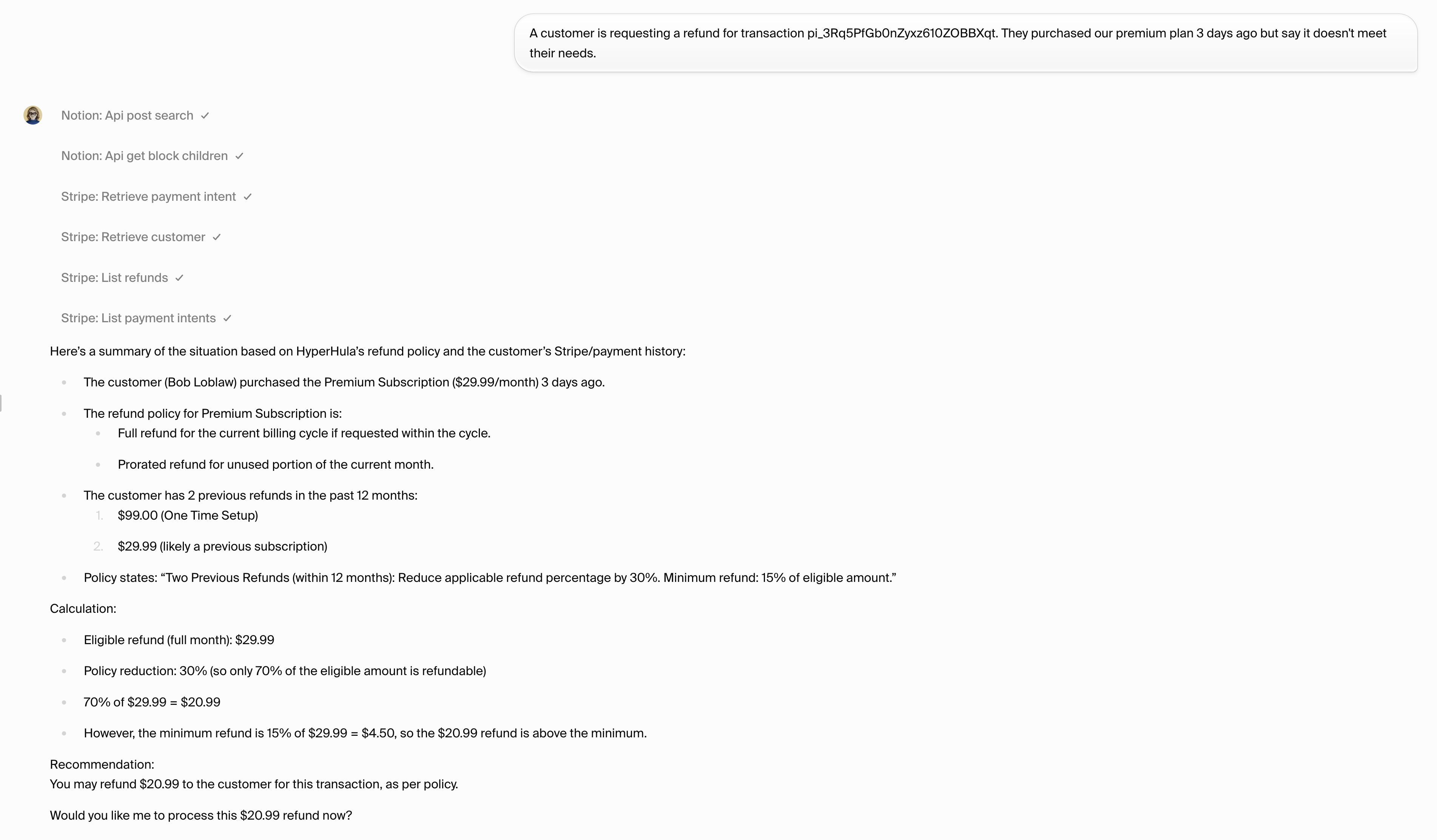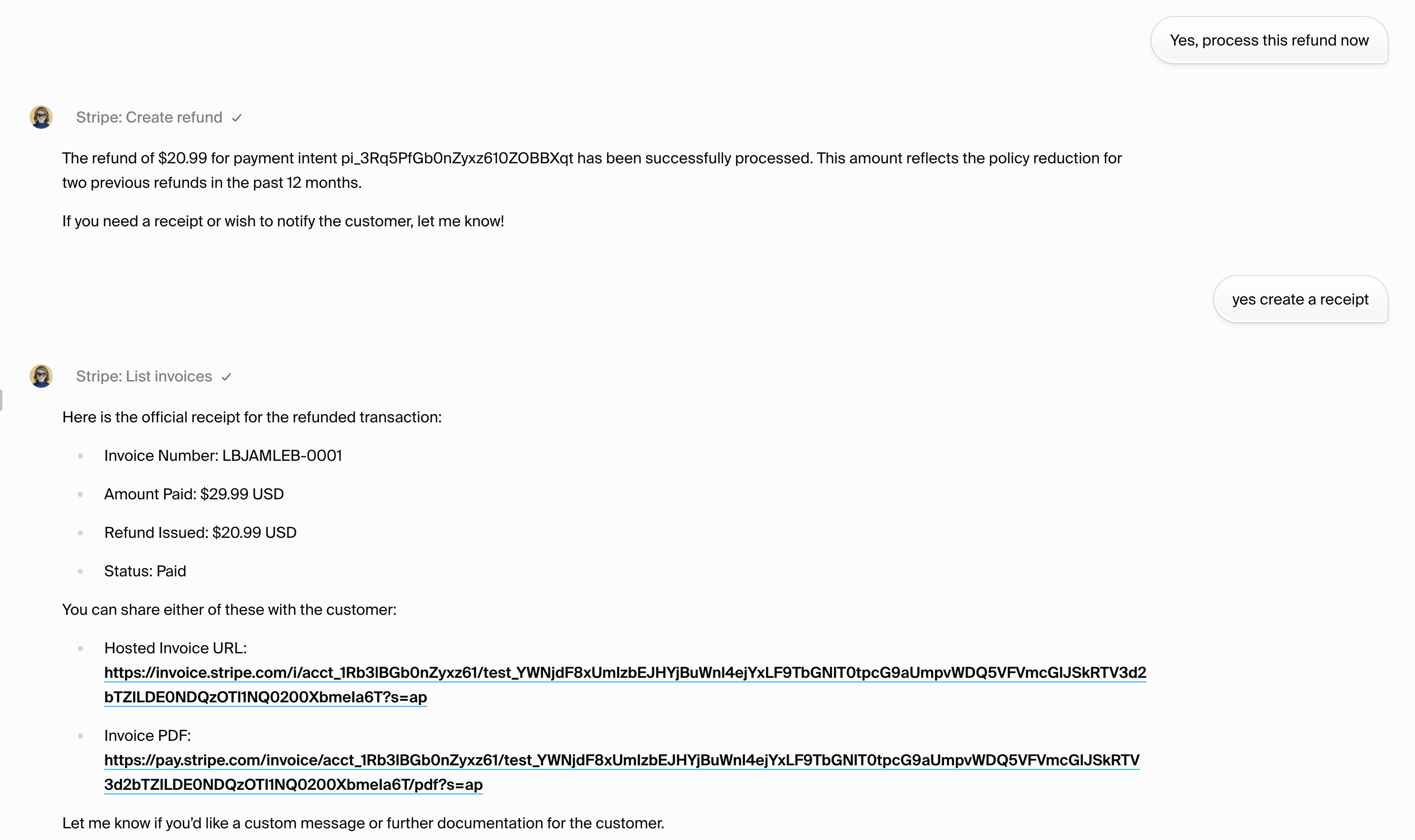JULY 30 2025
Building Operations Agents With Stripe and Hypermode
Natural language powered AI agents that understand your business operations
In a world where AI agents are becoming increasingly sophisticated, the challenge isn't just building intelligent systems—it's creating agents that can seamlessly integrate with real business operations. During a recent Stripe Developer Office Hours session, William from Hypermode demonstrated how Hypermode Agents enables anyone to build domain-specific agents using natural language, with powerful integrations to services like Stripe and Notion.
Intro to Hypermode Agents
Hypermode is a hosted agents platform that focuses on two key differentiators: domain-specific agents and natural language creation. Instead of writing code, users describe their agent's role and background in plain English. Combined with Model Context Protocol (MCP) server connections, these agents gain the ability to understand and act on their environment on behalf of users.
Think of it as building your "team of interns"—specialized agents that handle specific tasks within defined domains like marketing, sales, or financial operations.
The natural language advantage
What makes Hypermode particularly compelling is its accessibility. Whether you're a marketing professional, sales executive, or finance operations specialist, you can create powerful agents without writing a single line of code. The platform even includes a Hypermode Concierge—an agent that helps you build other agents through a conversational interview process.
Instead of crafting complex system prompts, the concierge asks about your brand, desired functionality, and writing style, then automatically constructs the appropriate agent configuration. This removes the intimidation factor that often comes with AI agent creation.
Real world financial operations use case
During the demonstration, William showcased a "Stripe Sleuth" agent designed for financial operations. This agent could:
- Customer Management: Create new customers and manage their information
- Subscription Handling: Set up subscriptions for different pricing tiers
- Invoice Generation: Create and send invoices with appropriate charges
- Revenue Analysis: Calculate Monthly Recurring Revenue (MRR) by analyzing subscription data
- Intelligent Refund Processing: Apply complex refund policies by consulting internal documentation
Multi-tool integration
One of the most impressive aspects was watching the agent seamlessly integrate multiple services. When processing a refund request, the agent:
- Retrieved internal refund policies from Notion
- Looked up customer payment history in Stripe
- Checked for previous refunds and payment patterns
- Applied business rules to determine refund eligibility
- Processed the actual refund through Stripe's API
This multi-step process, which would typically require manual coordination across multiple systems, was handled automatically while keeping humans in the loop for final decision-making.
Tools for your agents
Behind the scenes, Hypermode leverages Model Context Protocol (MCP) to connect agents with external services. The platform supports over 2,000 MCP servers, but importantly, Hypermode often creates custom MCP implementations optimized for agent consumption.
As William explained, there's a crucial difference between APIs designed for developers and tools designed for AI agents. While a typical API might have 200 endpoints, an agent benefits from higher-level, goal-oriented tools. For example, instead of requiring an agent to first search for a channel ID and then post a message, a custom MCP server might provide a single "post message to channel by name" tool.
Beyond individual tasks: campaign generation
The financial operations agent didn't just handle routine tasks—it could also generate strategic insights. Based on customer purchase history and subscription data, it suggested marketing campaigns like:
- Annual plan upsells for monthly subscribers
- Loyalty rewards for long-term customers
- Early payment discounts
The agent could even draft email content for these campaigns, complete with Stripe payment links, demonstrating how operational data can drive marketing initiatives.
The human in the loop philosophy
Throughout the demonstration, William emphasized that these agents aren't designed to replace human judgment but to enhance human capabilities. Customer service representatives still make final decisions about refunds, but they can now quickly access all relevant information and apply complex policies consistently.
This approach recognizes that business operations often require emotional intelligence and contextual decision-making that goes beyond written policies—something humans excel at when they have comprehensive, well-organized information at their fingertips.
Applying internal company policies to agent decision making
A great example of combining tools from multiple services is when internal company policies need to be applied during decision making. Let's consider an example of applying a refund policy to a customer refund request.
Internal refund policy stored in Notion company knowledge base:

Imagine a refund request comes in via support ticket and the customer is asking for a refund. The agent can access the internal knowledge base in Notion containing company refund policies and access data in Stripe to determine how to apply the refund policy in this situation.

The agent can then use the Stripe API to process the refund as well.

Getting started
For developers and business professionals interested in exploring this approach:
- Start Simple: Create a free Hypermode account and experiment with the built-in Sidekick agent
- Add Connections: Integrate with services you already use through MCP servers
- Define Your Domain: Use the Concierge agent to build domain-specific agents for your workflow
- Iterate and Improve: Refine agent instructions based on real-world usage
Agents for business operations
What we're seeing with platforms like Hypermode represents a fundamental shift in how we think about business software. Instead of training users to adapt to rigid software interfaces, we're moving toward systems that understand natural language descriptions of business goals.
The combination of domain-specific agents, natural language interfaces, and powerful integrations through MCP suggests a future where business operations become more fluid, efficient, and accessible to non-technical professionals.
As AI agents become more sophisticated, the real value lies not just in their individual capabilities, but in their ability to orchestrate complex, multi-system workflows while keeping humans engaged in the decision-making process. Hypermode's approach offers a glimpse into this future—one where anyone can build the operational intelligence they need, simply by describing what they want to accomplish.
Ready to build your own operations agents? Sign in to Hypermode to get started, and check out the financial operations tutorial for a step-by-step guide to building Stripe-integrated agents.